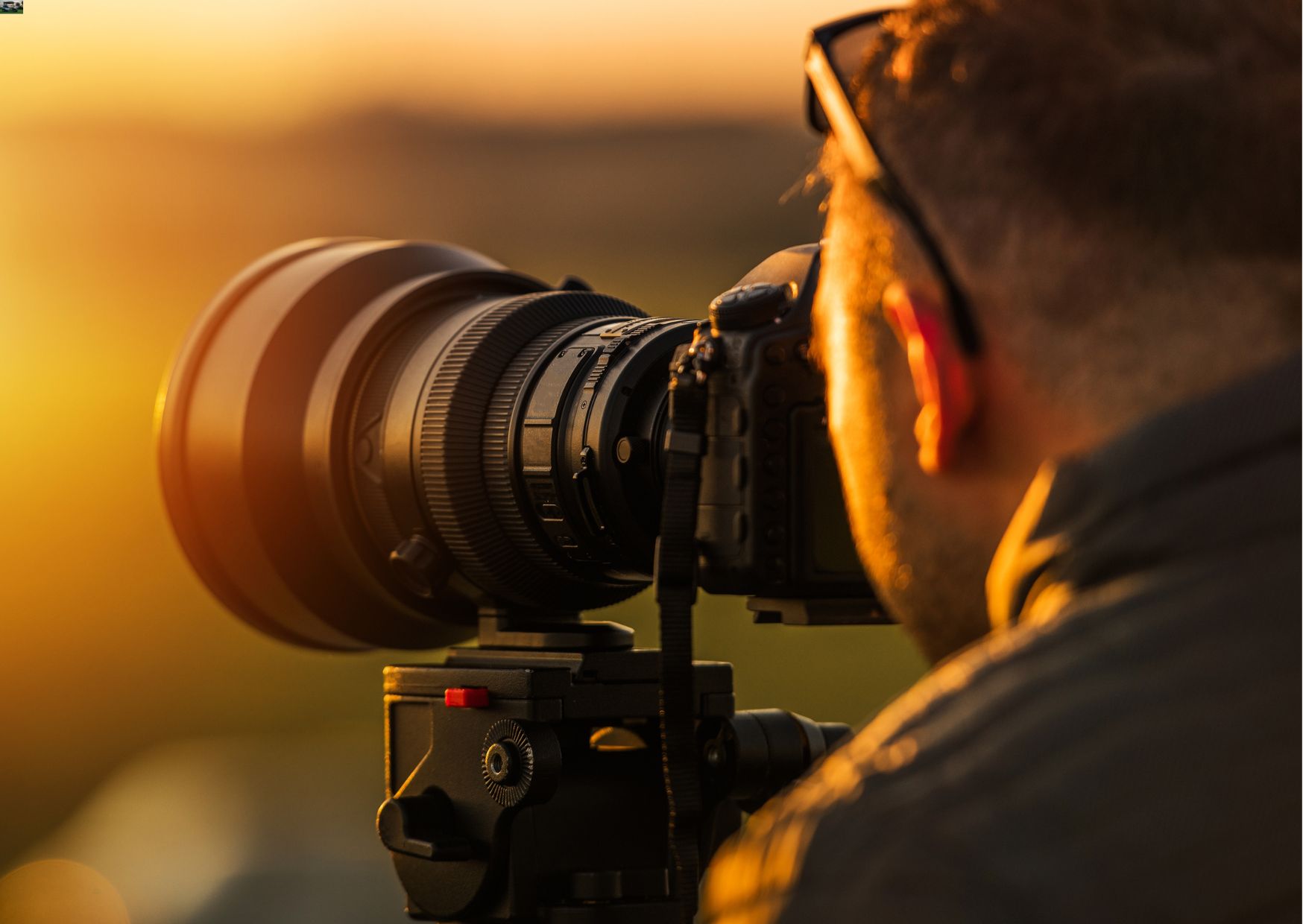Become a camera operator plays a vital role in the media industry and is responsible for capturing visual content for television, film, news, and other productions. They are instrumental in delivering high-quality visuals that align closely with the director’s creative vision.

What are the Main Types of Camera Operators
Camera operators are integral to various sectors of the media industry, each playing a distinct role in capturing visual content. Television camera operators manage cameras in studio settings or on location for live broadcasts and scripted shows, ensuring clarity and continuity under the director’s guidance. Film camera operators work on movie sets, collaborating closely with cinematographers to achieve cinematic effects and convey the director’s vision through precise camera work. News camera operators operate in fast-paced environments, capturing footage for news broadcasts with accuracy and timeliness to deliver informative content. Studio camera operators work within controlled settings, managing cameras for live broadcasts and recorded programmes, focusing on technical precision and creative framing.
Television Camera Operators
Television camera operators are skilled professionals responsible for operating cameras during television broadcasts, shows, and other productions. They play a pivotal role in capturing high-quality visual content that aligns with the director’s vision and the technical requirements of the production. Camera operators work in both studio settings and on location, maneuvering cameras to achieve optimal shots and ensure seamless recording of video content. Their expertise in camera operation, framing, and maintaining visual clarity is essential for delivering compelling and professional broadcasts to viewers.
Role and Key Responsibilities:
The primary role of a television cameraperson is to collaborate on television shows, news broadcasts, and other productions. They operate all cameras within a studio or on location to ensure clear video capture without interruptions to the action.
Film Camera Operators
Film camera operators are professionals responsible for operating cameras during film productions. They collaborate closely with directors and cinematographers to capture scenes according to the script and the director’s artistic vision. Their role involves setting up, adjusting, and operating various types of film cameras to achieve the desired visual composition and cinematic quality. Camera operators play a crucial part in translating the director’s vision into the final footage seen on screen, ensuring each shot aligns with the narrative and aesthetic requirements of the film.
Role and Key Responsibilities:
A film set camera operators collaborate closely with directors and cinematographers to meticulously capture scenes according to the script and the director’s artistic vision. Their role involves continuous setup, adjustment, and operation of various camera types to achieve the desired visual composition and cinematic quality for the film. By respecting the director’s creative direction and working in tandem with cinematographers, camera operators play a crucial part in shaping the final look and feel of the movie.
News Camera Operators
News camera operators are professionals employed by news organisations who operate cameras to capture visual content for news stories, interviews, and live broadcasts. They are responsible for filming events as they unfold, ensuring the footage is clear, relevant, and meets the standards of journalistic integrity and accuracy required by their organisation. These operators often work in dynamic and unpredictable environments, requiring quick reflexes and the ability to adapt to changing situations to effectively document news events.
Role and Key Responsibilities:
News camera operators are employed by news organisations and are responsible for operating cameras to capture footage for news stories, interviews, and live broadcasts. They frequently work on location and must be prepared to film promptly when required, ensuring they capture crucial moments and events effectively.
Studio Camera Operators
Studio camera operators are professionals who operate cameras within controlled studio environments, such as television studios. They play a crucial role in capturing footage for various productions, including TV shows, commercials, and live broadcasts. Working closely with directors and technical crews, studio camera operators ensure that shots are framed accurately according to the director’s instructions and technical requirements. They are responsible for adjusting camera settings, maintaining equipment, and capturing high-quality visuals that meet the standards of the production.
Role and Key Responsibilities:
Studio camera operators utilise cameras within controlled studio environments for shooting TV shows, commercials, and other productions. They execute camera operations under directorial guidance and collaborate closely with technical crews to ensure precise accuracy and high visual quality in the final output.
What does a Camera Operator do?
A camera operator’s job involves a variety of tasks critical to capturing high-quality visual content for film, television, news, and other media productions. They start by setting up and positioning camera equipment meticulously, ensuring optimal angles and perspectives to achieve the desired shots. During shoots, camera operators operate the equipment skillfully, adjusting focus, exposure, and other settings as needed to capture scenes precisely as outlined in shot lists and camera scripts. They collaborate closely with directors and production teams, interpreting creative visions and technical requirements to deliver visually compelling footage. Additionally, camera operators are responsible for the maintenance and occasional repair of camera equipment, ensuring uninterrupted workflow and consistent output of high-quality visuals.
Setting Up and Positioning Camera Equipment
In this role, camera operators are responsible for the precise installation and alignment of camera equipment to meet the specific needs of each production. They carefully mount lenses onto cameras, set up the cameras according to technical specifications, and ensure that all shots are steady and well-framed during filming. This involves adjusting camera angles, focus, and exposure settings as required to achieve the desired visual results. Their primary objective is to facilitate smooth and high-quality filming by maintaining technical accuracy and visual consistency throughout the production process.
Operating Camera Equipment During Shoots
During filming sessions, camera operators play a pivotal role in managing the camera’s operations. They skillfully adjust focus, exposure levels, and zoom settings to achieve the desired visual aesthetics as outlined by the production requirements. This involves continuous monitoring and fine-tuning of camera parameters to ensure each shot is crisp, well-exposed, and visually compelling. Their expertise in manipulating these technical aspects directly influences the quality and impact of the footage being captured, contributing significantly to the overall success of the production.
Collaborating with Directors and Production Teams
Camera operators collaborate closely with directors, cinematography teams, and other production crew members to craft specific aesthetics and compositions for each shot. Their role involves interpreting creative visions, adjusting camera angles, and framing shots meticulously to enhance the visual storytelling of the production. This collaborative effort ensures that every frame aligns with the overall artistic direction and narrative style intended for the film, television show, or other media projects they are working on.
Maintaining and Repairing Camera Equipment
Camera operators play a crucial role in the maintenance and upkeep of camera equipment, ensuring it remains in excellent working condition. This involves regular inspections, cleaning, and performing repairs when needed. By keeping the equipment well-maintained, operators ensure reliability and readiness for use during filming or broadcasting activities. This proactive approach helps minimise downtime and ensures that the equipment functions smoothly to capture high-quality images as required by the production.
Adjusting Focus, Exposure, and Other Camera Settings
Camera crews adjust focus, exposure, white balance, and other parameters to achieve the desired shot quality specified by the production. This meticulous adjustment ensures that each frame meets the visual standards required for the project, maintaining consistency and enhancing the overall cinematographic appeal of the footage.
Following Camera Scripts and Shot Lists
They adhere to the camera script, following the shot list provided by the director for the day’s shoot. This ensures that they capture the scenes and sequences as planned, maintaining continuity and fulfilling the director’s vision for the production.
Average Salary Range of a Camera Operator
The average salary for camera operators varies based on their experience, geographic location, and the industry they work in. Entry-level camera operators typically earn less than those with more experience. Salaries also differ across regions, with urban areas generally offering higher compensation due to higher living costs and demand. Industries such as film, television, and advertising may offer competitive salaries compared to other sectors. Factors influencing salary include experience level, additional skills like editing or lighting, and union memberships in some cases. Overall, camera operators can expect their earnings to reflect their skill level, location, and the industry they are employed in.
Salary Ranges Based on Experience and Location
Salaries for camera operators vary based on experience, location, and industry. Beginners in the UK can anticipate earning between £18,000 and £25,000 annually (£30,000 to $45,000 per year in the US). As camera operators gain experience, mid-level professionals typically earn between £25,000 and £40,000 annually in the UK (£45,000 to $65,000 in the US). Senior operators or those in specialised roles in the UK can earn £40,000 to £60,000 or more annually (£65,000 to $100,000 or more in the US). Earnings vary based on experience, location, and industry demand, reflecting the expertise and responsibilities of camera operators in different roles.
Comparison of Salaries in Different Regions and Industries
Geographical location plays a significant role in determining salaries, with cities like London, New York, and Los Angeles serving as major hubs for film and TV production, often offering higher pay than other regions. Camera operators involved in high-budget productions or specialised niche industries also have the potential to earn a higher salary based on the specific demands and expertise required in those fields. These disparities highlight the influence of location and industry specialization on camera operator compensation.
Factors that Influencing Camera Operator Salaries
Several factors can influence camera operator salaries such as;
- Experience: Camera operators with greater experience typically command higher salaries. Seasoned professionals often possess superior skills honed over years in the field, leading to greater responsibilities and higher pay.
- Credentials: Advanced degrees and formal certifications can enhance an operator’s earning potential by demonstrating specialised knowledge and dedication to professional development.
- Industry: The sector in which a camera operator is employed plays a pivotal role in determining salary scales. Industries like film, television, and advertising often offer competitive wages compared to other sectors.
Essential Skills of a Camera Operator
Camera operators need a range of skills to do their job well. They must be good with technical aspects like operating equipment and adjusting settings. They also need soft skills such as communication, problem-solving, paying attention to details, and working well under pressure. These abilities help them work closely with teams, achieve creative goals, and ensure high-quality filming.
Technical Skills
- Proficiency in Camera Equipment and Software: Operators need to be skilled in operating a range of camera equipment and related software to capture high-quality footage.
- Understanding of Lighting and Composition: Understanding lighting and composition is crucial. It involves knowing how to illuminate scenes effectively and arrange visual elements to create compelling images or footage.

Soft Skills
- Communication: Effective communication skills are crucial for collaborating with directors, production teams, and actors.
- Creativity: Creativity is essential for generating imaginative shots and enhancing the overall production.
- Attention to detail: Being detail-oriented is necessary to ensure each shot is perfectly framed and technically accurate.
- Physical stamina: Physical stamina is required to handle heavy camera equipment, stand for long hours, and endure the demands of the production environment.
Career Development Tips for Camera Operators
Staying updated with the latest camera technology and industry trends, networking through professional organisations and film festivals, gaining skills through internships, and continually refining technical and creative abilities are essential for camera operators to thrive in their careers.
- Staying Updated with the Latest Technology and Industry Trends: Staying updated with the latest technology and industry trends involves keeping abreast of advancements in camera technology and current trends in the industry
- Networking Through Professional Organisations and Film Festivals: Joining professional organizations and attending film festivals provides valuable networking opportunities and access to resources.
- Internships/Entry-level positions: Internships and entry-level positions are crucial for gaining practical skills and establishing a solid reputation through hands-on experience.
- Continuously Improving Technical and Creative Skills: Camera operators also need to continuously improve their technical and creative skills by regularly practising and refining their abilities, which is essential for long-term career success in the field.
Qualifications and Requirements for Camera Operator
Camera operators typically need a degree or diploma in film, media, or related fields for entry into the profession. While certifications in specific equipment or techniques can enhance their credentials, practical experience through internships or entry-level positions is crucial for developing skills and gaining industry-standard knowledge.
Educational Requirements
- Degree or Diploma in Film, Media, or Related Field: A degree or diploma in film, media, or a related field is essential for all positions. Candidates must have completed this qualification.
- Relevant Coursework or Training Programs: Relevant coursework or training programmes can provide valuable skills and knowledge.
Certification Requirements (If Applicable)
- Certification from Professional Organisations or Training Programs: Certification from professional organisations or training programmes demonstrates training and competence, underscoring a commitment to professional standards.
- Safety Training in Camera Operation: Completion of health and safety training specific to camera operation, ensuring adherence to industry standards and protocols during shoots.
Experience Requirements
- Internships and entry-level positions: Practical experience gained through internships or entry-level roles enhances theoretical knowledge.
- Reputation-Building: Developing skills and gaining experience is necessary to establish the foundation of one’s professional reputation.
How to Become a Camera Operator?
To become a camera operator, start by completing a relevant degree or diploma in film, media, or a related field. Gain practical experience through internships or entry-level positions. Certification from recognised organisations can boost credibility. Keep skills updated through continuous professional development and network within the industry for opportunities and insights.
Completing Relevant Education
- Obtaining a Degree in Film, Media, or a Related Field: Earn a college degree or diploma in film, media, or a related field.
- Attend a Specialised Course/Training Programme: Take a specialised course or training programme to gain practical skills or learn a specific process.
Gaining Practical Experience
- Acquiring Practical Experience: Gaining practical experience is essential for becoming a camera operator because it allows individuals to develop hands-on skills in operating various camera equipment and understanding the nuances of filming in different environments.
- Internships and entry-level jobs: Take paid or unpaid internships and entry-level jobs to gain experience in the specific work you want to pursue and build a portfolio.
Obtaining Certification (If Applicable)
- Certifications from Professional Organisations or Training Programmes: Certifications from professional organisations or training programmes can help you demonstrate to clients or potential employers that you are competent, informed, and committed to professional standards.
- Technical Skill Certification: Obtaining technical skill certification as a camera operator validates your proficiency in handling various camera equipment, ensuring you can confidently execute filming tasks across different environments and productions.
Continuing Professional Development
- Workshops, seminars, and Webinars: Engage in continuous professional development through various training opportunities.
- Advanced training and Specialisations: Pursue advanced training and specialisations to further develop your expertise.
Networking
- Professional Organisations: Networking with professionals to acquire insider information and get hired is perhaps the most important feature of the ICG, the International Cinematographers Guild.
- Go to Film Festivals and Industry Events: Attend film festivals and industry events. Network, network, network.
Get Qualified as a Camera Operator
Interview Series Debut: Lights, Camera, Action, Lights, Camera, Action: Debuting Your Interview Series
Top 8 Frequently Asked Questions (FAQ)

- Why should you be a Camera Operator?
A career as a camera operator can provide you with much more: it’s an exciting, creative, fast-paced, and hands-on role where you’ll have the chance to express your creativity and gain diverse experiences. You’ll work on a range of productions, from film and television to news and live events. It’s an integral part of modern media and offers full-time employment with opportunities for training and career development within the same organisation. Additionally, it provides the satisfaction of creating visually appealing content and directly influencing the final product.
- Is Camera Operation a Good Career Choice for You?
If you’re looking for a career where you can use images to tell stories, work well with technology, and have a keen eye for detail, camera operation is an excellent choice. It’s suited for creative individuals who are technically inclined and thrive under pressure. Collaborating with others to visually narrate stories and capture people’s attention makes this role highly rewarding.
- How Much Does a Camera Operator Earn?
Salaries for camera operators vary depending on experience, location, and industry. Those just starting in the UK earn between £18,000 and £25,000 per year, and between $30,000 to $45,000 per year in the US. Once they have some experience, mid-level camera operators earn up to £25,000 and £40,000 per year in the UK, and between $45,000 to $65,000 in the US. Senior operators, or those working in niche areas, earn £40,000 to £60,000 or more per year in the UK, and $65,000 to $100,000 or more per year in the US.
- Which Qualifications Can Help with a Career in Camera Operation?
To pursue a career in camera operation, it’s essential to obtain a degree or diploma in film, media, or a related field. Practical skills and knowledge are equally crucial, which can be acquired through specialised courses, training programmes, and certifications from professional organisations. Internships and entry-level jobs also play a significant role in skill development and building a professional reputation.
- Do I Need to Be Experienced to Get Started?
Experience is not always a prerequisite to enter the camera industry. Many aspiring camera operators begin by attending educational programmes or interning at production companies. Enthusiasm, a love for learning, and a passion for visual storytelling are key ingredients for launching a successful career in camera operation.
- Career Outlook as a Camera Operator
The career outlook for camera operators is promising, with a high demand for skilled professionals across various media branches. The continuous growth in content production ensures a steady demand for talented individuals, making this profession secure with competitive salaries and clear career advancement opportunities.
- Camera Operator Hierarchy and Progressing Within the Role
Beginners typically start as camera assistants or junior operators, progressing to senior roles such as camera supervisor or senior operator after gaining years of experience and training. Further career advancement opportunities include roles like director of photography, cinematographer, or head of the camera department. Continuous learning and gaining certifications from professional organisations enable professionals to enhance their skills and pursue higher positions in the field.
- Camera Operator Exit Options and Opportunities
Camera operators possess transferable skills that open up various career paths beyond their initial role. Experienced operators can transition into roles such as cinematographer, director, or film producer. They may also explore opportunities as a director of photography, video editor, or production manager. Some choose to further their education and become educators or trainers in media and film production, working at universities or film schools.


